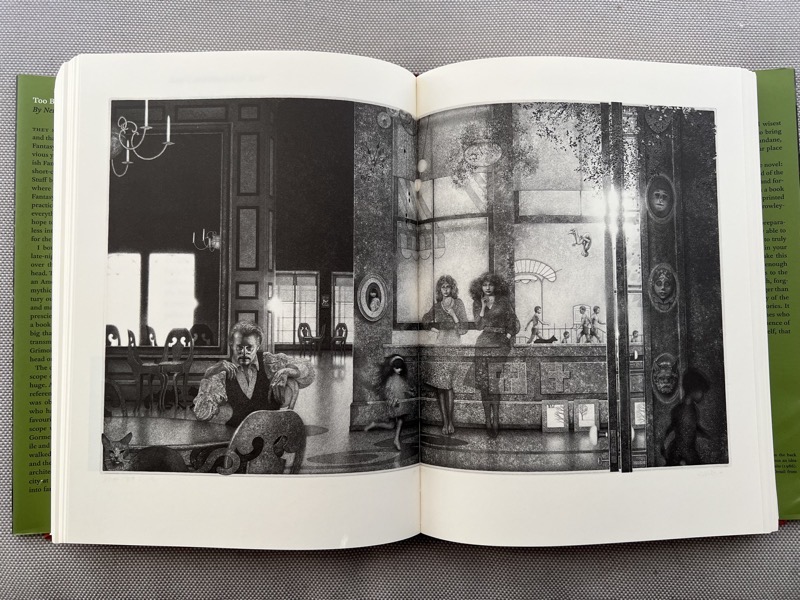Megan McArdle, with a thought-provoking argument: “Once Musk readmitted the views and people they abhor, the left began abandoning the common space for smaller, more ideologically homogenous services where it is easier to police one another, but harder to police the discourse. And the more peripheral progressives become, the more institutions will grope their way back to the middle of the road.”
This interview with A. G. Sulzberger on the Dispatch Podcast is fascinating. So informative about both the challenges and the opportunities for journalism today.
Forthcoming in Comment

Little, Big
My friend Adam Roberts wrote recently about John Crowley’s Little, Big, which is (a) one of my very favorite novels and (b) a book I have never written about. I suspect that I've never written about it precisely because it means so much to me. One day perhaps I will get to the bottom of this. But for now I just want to make a few comments.
One: Adam thinks the book is a version of baroque, but I don’t think I agree. My inclination is to say that there are forms of elaboration other than the baroque, and Crowley dwells in one of those traditions. His imagination, especially his visual imagination, seems to me to arise from the vision of art that begins with the Pre-Raphaelites, moves on through William Morris, and culminates in the Arts & Crafts movement, which in the first two decades of the twentieth century — the period in which Edgewood was built — was a very big thing in the upstate-New-York world to which Crowley is always drawn. (The Aegypt books are set there too.) Edgewood is surely a house in this tradition, though in its decorated rather than its spare aspect. If you imagine Richard Norman Shaw’s Cragside sitting in a heavily forested corner of the Catskills I think you might envision Edgewood correctly.

Also, the women of Little, Big are often very much in the Pre-Raphaelite “stunner” mode. (Primarily the Elizabeth Siddall cascading-redhead type rather than the Jane Morris darkly-brooding type.) Cf. Rossetti’s The Beloved, which could be a depiction of the enthronement of Daily Alice:

Peter Milton’s illustrations for the rather magnificent 40th anniversary edition of the book capture some of the feel of the novel, though with an Art Deco tinge that might not be elaborate enough:

That’s not wrong, exactly, but I think it’s missing the density of detail present in so many Pre-Raphaelite paintings and William Morris designs, e.g. the Green Dining Room:

I think if you stripped the Pre-Raphaelite visual world of its medievalism — there ain’t no medieval culture here in the Americas — you’d be getting close to the visual aesthetic of Little, Big.
Two: I think almost the whole of Crowley’s imagination — in his fantasies, though not in his many non-fantastic writings — derives from two books, both of them by Frances Yates: The Art of Memory and The Rosicrucian Enlightenment. The first is a book about making the events and experiences and encounters of the past meaningful and coherent; the second is a book about achieving a nirvana, a wholly enlightened consciousness. The Chymical Wedding of Christian Rosenkreutz is re-enacted or re-interpreted several times in Crowley’s work, including the marriage of Smoky and Daily Alice. (Colin Burrow, in an essay that Adam cites, notes this influence and thinks that current scholarly skepticism about Yates’s arguments creates a “big problem” for Crowley’s fiction, though I don’t know why that would be. Surely works of literary art don’t need to be grounded in sound scholarship to be good stories. The discrediting of the Ptomelaic cosmos doesn’t make the Divine Comedy less compelling.)
It may be that Crowley sees us as having to choose between the two visions of Yates’s two books: that is, we can have a history that takes beautiful form or a beatific vision of total Meaning. Those granted nirvana leave their history behind, as the fairies leave behind Edgewood; that it is “a house made of time” is why they must leave it. You could say that Edgewood is the real protagonist of the story because it enables enlightenment for the fairies and for Smoky the completion of his Tale. And so at the end it runs on, telling its story because it doesn’t know how to do anything else, though both of its audiences have departed. I don’t know anything lovelier in literature than the final paragraph of Little, Big, a book that does not begin but rather ends with “once upon a time.”
(There are, I think, three chief sources of image and myth in Crowley’s fantasies: the Arts & Crafts movement, the Rosicrucian Enlightenment, and one more: the counterculture of the Sixties, which I think Crowley sees as, at its best, inheriting those earlier movements — but never quite laying firm hold on them. Swerving from what it could have been and should have been. But that’s more of a theme in the Aegypt books than Little, Big.)
Three: Little, Big is full of Sehnsucht, it is a “search for the blue flower” story, and I don’t know any other book that better depicts this experience. (I don’t agree with Burrow that such a fantasy is “a conscious substitute for the magic in which you don’t quite believe any more”; I think it’s in no way a substitute, but a pointer towards something that necessarily remains always out of reach.) I also think — and this is not unrelated — that Little, Big is an illustration of the fact that for us mortals “death is the mother of beauty”: Smoky’s apprehension of the Tale is shaped wholly by the fact that he will not inherit it, is not made to inherit and inhabit it, but through helping it to come to be he plays a part that only an outsider to its full enactment can play. It is beautiful to him in a way that it cannot be to its participants; that is its gift to him. There is an inevitable asymmetry in his marriage which somehow make it stronger and more wonderful rather than weaker: he loves Daily Alice differently than she loves him. She occupies almost the whole of his short life; he can be to her only a moment, though perhaps the dearest moment, in an endless one. (It is very sweet to me that she and only she knows where he is buried.)
I think by calling attention to this asymmetry he remedies the biggest defect in The King of Elfland’s Daughter: Dunsany never acknowledges that by bringing the whole of Erl into Elfland he has taken away the very thing that makes Lirazel ache for her husband and family: their mortality. Blake’s “Eternity is in love with the productions of time” is the mirror-image of Sehnsucht, and Crowley gets that, while Dunsany, I think, does not.
I tried AudioPen today. If you want to have your own words converted into the bland, characterless, impersonal, inhuman anti-style of bureaucracies and HR departments, this is the app for you.
“Now Angus, be still, your breeder wants a nice portrait of you.”

What I want: a universal de-notification button. “Click here if you do not wish to receive any notifications, from anyone, for the rest of your life.”
How to read weather forecasts in central Texas: If the chance of precipitation is
- 100% — there’s a 66% chance of rain
- 75% — there’s a 33% chance of rain
- Anything below 75%, it ain’t gonna rain
Oh, also here’s my handy guide for people who think they might want to read Pynchon but find the prospect intimidating.
My ginormous essay on Thomas Pynchon, theologian has escaped its paywall and is available for all to read on the open web. I hope it will generate some useful conversations.
Me: (excitedly explains something I read about Churchill and FDR)
My son: You know, Dad, I think it’s a law of nature that every American man, at some point between age 50 and age 70, gets obsessed by World War II.
Me: I guess this is my time?
My son: Looks like.
more on SCOTUS and university admissions
Just a few random thoughts about the Harvard opinion. (On this blog I tend to avoid opining on current events, but I am endlessly fascinated by the law, by legal reasoning, and by the various strategies of legal interpretation. As Stanley Fish discovered a long time ago, there’s much overlap between literary and legal interpretation. I caught the bug from him.)
In Sotomayor’s dissent, she describes the majority opinion in this way:
Today, the Court concludes that indifference to race is the only constitutionally permissible means to achieve racial equality in college admissions. That interpretation of the Fourteenth Amendment is not only contrary to precedent and the entire teachings of our history, see supra, at 2–17, but is also grounded in the illusion that racial inequality was a problem of a different generation. Entrenched racial inequality remains a reality today. That is true for society writ large and, more specifically, for Harvard and the University of North Carolina (UNC), two institutions with a long history of racial exclusion. Ignoring race will not equalize a society that is racially unequal. What was true in the 1860s, and again in 1954, is true today: Equality requires acknowledgment of inequality.
The problem is that this description is wrong. Indeed, later on she walks some of this back, admitting that “The majority does not dispute that some uses of race are constitutionally permissible. See ante, at 15. Indeed, it agrees that a limited use of race is permissible in some college admissions programs.” So the majority opinion does not demand “indifference to race” (even if Justice Thomas would probably like it to).
But unless I missed it — and I may have; her dissent is lengthy — she doesn’t walk back the baldly false claim that the majority holds to “the illusion that racial inequality was a problem of a different generation.”
Thomas in his concurrence: “I, of course, agree that our society is not, and has never been, colorblind.” Gorsuch in his concurrence: “In the aftermath of the Civil War, Congress took vital steps toward realizing the promise of equality under the law. As important as those initial efforts were, much work remained to be done — and much remains today.” Kavanaugh in his concurrence: “To be clear, although progress has been made since Bakke and Grutter, racial discrimination still occurs and the effects of past racial discrimination still persist.“ (Probably not great for collegiality when one justice forcefully accuses her colleagues of holding views that they have explicitly disavowed. It’s disappointing to see Sotomayor writing in such open disregard for the truth of her statements — but that’s the world we live in.)
Only Roberts, writing for the Court, doesn’t make any such statement, because in his legal reasoning it doesn’t matter. Racial inequality could be better than it used to be, about the same, or worse — it doesn’t matter. The only thing that matters is whether the policies employed by Harvard and UNC are legally justifiable. That’s his whole argument.
By contrast, what matters to Sotomayor is that the policies work:
The use of race in college admissions has had profound consequences by increasing the enrollment of underrepresented minorities on college campuses. This Court presupposes that segregation is a sin of the past and that raceconscious college admissions have played no role in the progress society has made. The fact that affirmative action in higher education “has worked and is continuing to work” is no reason to abandon the practice today.
Justice Jackson’s dissent operates under a similar logic: racism is an ongoing social problem, these policies are remedies for racism, therefore these policies are justifiable. But that’s a strange argument for a jurist to make. Many practices work — I could list a thousand tactics police departments have used to reduce crime — but that doesn’t make them legal. So these arguments by Sotomayor and Jackson seem to be outside the scope of their duties. But then, the same is true of Thomas’s dissent, which devotes a great deal of time to arguing that such policies do not work, do not accomplish their goals. That’s actually the chief burden of his concurrence, in which he directs much of his fire towards Jackson: You think policies like this help people like us, but they don’t.
The funny thing about all this is that Harvard and UNC in their briefs and oral arguments explicitly denied that their policies attempt to remediate the consequences of past and ongoing racism — they say that it’s all about creating “diversity.” They did so because SCOTUS precedent wouldn’t have worked in their favor if they had admitted that remediation of injustice is their goal. (Too long a story to get into here.) But the fact that, except for Roberts, the justices largely ignore the explicit justification and instead argue about the role that university admissions play or do not play in remedying injustice indicates that they know what the real reasons for these policies are.
Again and again Sotomayor and Jackson say Racism is bad, why is the majority denying that racism is bad? And again and again the majority say, Of course racism is bad, but our task is not to end racism, our task is to decide this case. (Kagan’s silence on this case is disappointing, since she joined Sotomayor and Jackson, and is an infinitely superior thinker and writer. My guess is that she has her own reasons, quite different from Sotomayor’s and Jackson’s, for dissenting; I’d like to know what they are.)
If even Supreme Court Justices don’t know what their job is, how can the rest of us be expected to? Representative Alexandria Ocasio-Cortez has been tweeting that if the court really believed in color-blindness it would have ended legacy admissions. But nobody brought a suit against legacy admissions. Does AOC really think that the Supreme Court can just decree at any time the end of any practice they think unjust? Actually, she might; it’s perfectly possible that she has no idea how the Supreme Court, or the legal system more generally, works. But I think it’s slightly more likely that she’s just performing rage for her social media audience. That’s perhaps to be expected. What’s less expected is for Supreme Court justices to be doing the same thing.
If she would only look at me the way she looks at Angus….

forums
As far as how humans connect to one another, what’s next appears to be group chats and private messaging and forums, returning back to a time when we mostly just talked to the people we know. Maybe that’s a better, less problematic way to live life. Maybe feed and algorithms and the “global town square” were a bad idea. But I find myself desperately looking for new places that feel like everyone’s there. The place where I can simultaneously hear about NBA rumors and cool new AI apps, where I can chat with my friends and coworkers and Nicki Minaj. For a while, there were a few platforms that felt like they had everybody together, hanging out in a single space. Now there are none.
To each his own, of course, but after seven or eight years on Twitter — I started in early 2007 — I decided that “everybody together, hanging out in a single space” was a nightmare from which I hoped to awake. It took me a while to awaken completely, but I finally got there, and don’t ever want to go back.
Pierce is wrong about one thing: maybe group chats and private messaging are focused on talking to “the people we know,” but that’s not true of forums, which tend to be built around common interests rather than personal acquaintance. I’m hoping that with all of Reddit’s self-inflicted wounds we’ll get some alternatives, but you know, we could do worse than go back to Usenet.
Actually, I think that would be really cool. I’d love to see a Usenet renaissance, in which case maybe Panic would resume development of their fabulous old Usenet client Unison.
(But yes, I know that there are problems with this idea. But a guy can dream. And there are infinitely fewer barriers to the fixing of open protocols than to the stable, lasting repair of closed ones.)
This is the second time recently that I’ve found an old lo-res photo on my Mac that caught my interest. This from Shenandoah National Park in 2008.

The degenerate monarchists at The Rest Is History podcast have done something extraordinary: they’ve brought out my hidden patriotism.
patriotic effusion for Independence Day
I have always, I feel, been somewhat deficient in patriotism — I just don’t have the instinct for it, somehow — but listening to the recent Rest Is History series on the American Revolution got my red-white-and-blue blood up. (I say this, by the way, as a fully paid-up Wang — i.e., member of The Rest Is History Club.) George Washington had wooden teeth (ha ha ha) — Benjamin Franklin went around London “dispensing his wisdom” (ha ha ha) — Aren’t the colonists’ complaints obviously bogus? (ha ha ha) — Why do Americans have a holiday celebrating a press release? (ha ha ha) — Thomas Jefferson is a “phrasemaker” and the American Robespierre … wait, what? I don’t seem to recall Jefferson’s presiding over a Reign of Terror.
In general, I think Brits are the least trustworthy commenters on the United States — in any venue, from the left or the right, I avoid such commentary, because I know it will be filled with overconfident generalizations and smug condescension. Both of those faults arise from the writers’ belief that they have as it were a Special Relationship with the U.S.A. and can therefore interpret it authoritatively. (People from other nations might be even more critical but they are less likely to write or speak from that particular variety of smugness.) I think it telling that when Tom and Dominic did a series on the Irish quest for Home Rule they got an Irishman to guide them — Paul Rouse, who was great — and were highly deferential to his judgments, but when it came time to cover the American Revolution they saw no need for an American perspective.
At the very end there was a brief acknowledgment that George Washington did not become a tyrant when he had the opportunity to do so, and that that’s admirable, but then they immediately went on to talk about his owning of slaves. The overall tone of the episodes converged on a kind of ironic mockery, which I found disappointing not just because I’m an American (I think) but mainly because of its inaccuracy. The leaders of that Revolutionary generation were extraordinary men — it’s almost unimaginable that one moment in history, in so small a nation, would produce figures as prodigiously and variously gifted as Franklin, Washington, Adams, Jefferson, and the ever-underrated Madison. (Though Madison was a little too young to have much of a role in the Revolution proper, he was essential thereafter.)
For a better, clearer, juster view, I would recommend John J. Ellis’s excellent Founding Brothers, but even more than that an extraordinary book that is unaccountably out of print: Garry Wills’s Cincinnatus: George Washington and the Enlightenment. No other work that I know of so fascinatingly illuminates the character of George Washington – and the way he was understood by his most thoughtful contemporaries. Thus this statue on the Lawn of the University of Virginia:

Note the fasces, which Washington is about to set aside – you can’t quite see it, but behind him is a plow. If, looking at that statue, you were to turn 180º, you’d see across the Lawn a companion statue, this of a seated Jefferson, gazing contemplatively at Washington — perhaps to admire, but perhaps to make sure Washington does indeed follow the example of Cincinnatus. For it is a model easier to invoke than to imitate.
In this spirit, we might also read an essay from 2021 by my friend Rick Gibson on Washington’s Farewell Address.
Let’s conclude by delivering to these unrepentant monarchists some home truths, as articulated by Jefferson in a letter to John Langdon (1810):
When I observed however that the king of England was a cypher, I did not mean to confine the observation to the mere individual now on that throne. The practice of kings marrying only into the families of kings, has been that of Europe for some centuries. Now, take any race of animals, confine them in idleness & inaction whether in a stye, a stable, or a stateroom, pamper them with high diet, gratify all their sexual appetites, immerse them in sensualities, nourish their passions, let every thing bend before them, & banish whatever might lead them to think, & in a few generations they become all body & no mind: & this too by a law of nature, by that very law by which we are in the constant practice of changing the characters & propensities of the animals we raise for our own purposes. Such is the regimen in raising kings, & in this way they had gone on for centuries. While in Europe, I often amused myself with contemplating the characters of the then reigning sovereigns of Europe. Louis the XVIth was a fool, of my own knowledge, & in despite of the answers made for him at his trial. The king of Spain was a fool, & of Naples the same. They passed their lives in hunting, & dispatched two couriers a week, 1000 miles, to let each other know what game they had killed the preceding days. The king of Sardinia was a fool. All these were Bourbons. The Queen of Portugal, a Braganza, was an idiot by nature & so was the king of Denmark. Their sons, as regents, exercised the powers of government. The king of Prussia, successor to the great Frederic, was a mere hog in body as well as in mind. Gustavus of Sweden, & Joseph of Austria were really crazy, & George of England you know was in a straight waistcoat.
And so on that note: All praise to the Founders, and confusion to degenerate monarchies!

P.S. This is unrelated to the diatribe above, but I can’t resist adding it. Adam Smith, the scholarly guest on the podcast, comments at one point that Benjamin Franklin’s only interest in George Whitefield was in determining the range at which he could project his voice. Franklin was certainly interested in that, but not in that only. Here’s my favorite passage in the whole of Franklin’s Autobiography:
Mr. Whitefield, in leaving us, went preaching all the way thro’ the colonies to Georgia. The settlement of that province had lately been begun, but, instead of being made with hardy, industrious husbandmen, accustomed to labour, the only people fit for such an enterprise, it was with families of broken shop-keepers and other insolvent debtors, many of indolent and idle habits, taken out of the jails, who, being set down in the woods, unqualified for clearing land, and unable to endure the hardships of a new settlement, perished in numbers, leaving many helpless children unprovided for. The sight of their miserable situation inspir’d the benevolent heart of Mr. Whitefield with the idea of building an Orphan House there, in which they might be supported and educated. Returning northward, he preach’d up this charity, and made large collections, for his eloquence had a wonderful power over the hearts and purses of his hearers, of which I myself was an instance.
I did not disapprove of the design, but, as Georgia was then destitute of materials and workmen, and it was proposed to send them from Philadelphia at a great expense, I thought it would have been better to have built the house here, and brought the children to it. This I advis’d; but he was resolute in his first project, rejected my counsel, and I therefore refus’d to contribute. I happened soon after to attend one of his sermons, in the course of which I perceived he intended to finish with a collection, and I silently resolved he should get nothing from me. I had in my pocket a handful of copper money, three or four silver dollars, and five pistoles in gold. As he proceeded I began to soften, and concluded to give the coppers. Another stroke of his oratory made me asham’d of that, and determin’d me to give the silver; and he finish’d so admirably, that I empty’d my pocket wholly into the collector’s dish, gold and all.
George Orwell, review of Mein Kampf (1940):
Nearly all western thought since the last war, certainly all “progressive” thought, has assumed tacitly that human beings desire nothing beyond ease, security and avoidance of pain. In such a view of life there is no room, for instance, for patriotism and the military virtues. The Socialist who finds his children playing with soldiers is usually upset, but he is never able to think of a substitute for the tin soldiers; tin pacifists somehow won’t do. Hitler, because in his own joyless mind he feels it with exceptional strength, knows that human beings don’t only want comfort, safety, short working-hours, hygiene, birth-control and, in general, common sense; they also, at least intermittently, want struggle and self-sacrifice, not to mention drums, flags and loyalty-parades. However they may be as economic theories, Fascism and Nazism are psychologically far sounder than any hedonistic conception of life. The same is probably true of Stalin’s militarised version of Socialism. All three of the great dictators have enhanced their power by imposing intolerable burdens on their peoples. Whereas Socialism, and even capitalism in a more grudging way, have said to people “I offer you a good time,” Hitler has said to them “I offer you struggle, danger and death,” and as a result a whole nation flings itself at his feet. Perhaps later on they will get sick of it and change their minds, as at the end of the last war. After a few years of slaughter and starvation “Greatest happiness of the greatest number” is a good slogan, but at this moment “Better an end with horror than a horror without end” is a winner. Now that we are fighting against the man who coined it, we ought not to underrate its emotional appeal.
UPDATE: My friend Adam Roberts thinks that this review may have inspired one of Churchill's most famous speeches.
